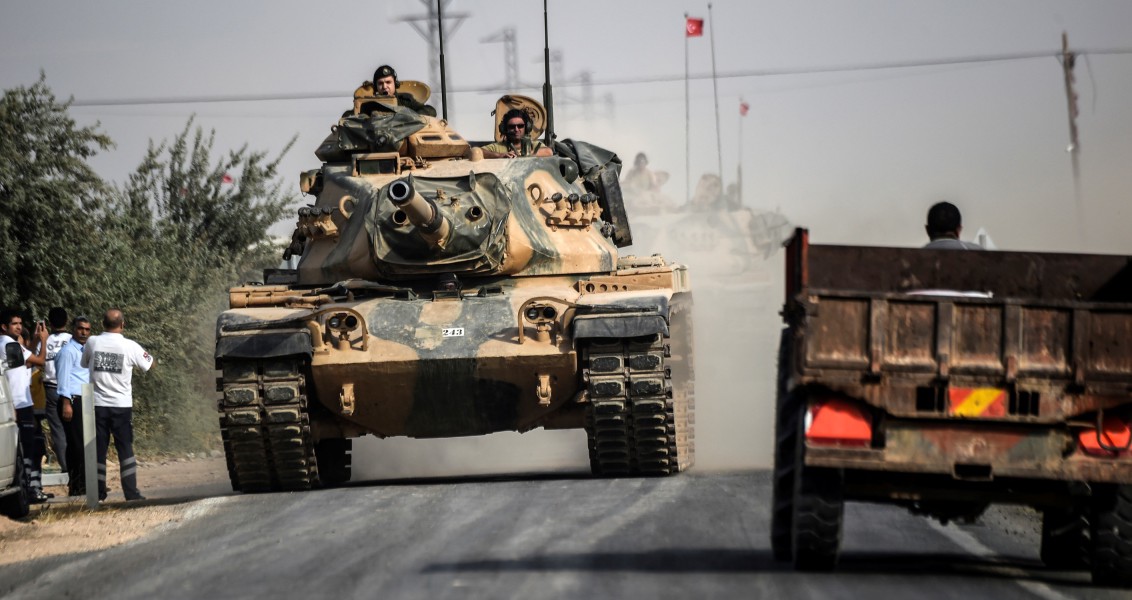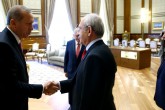Having launched operation Euphrates Shield on Aug. 24, Turkey not only helped the Free Syrian Army (FSA) liberate Jarablus but also became directly involved in the Syrian civil war.
After years of futile negotiations with Turkey’s allies over a proposed safe zone in northern Syria, the government took the initiative and provided active support to the moderates. According to initial reactions from Washington, the United States had been informed about the decision in advance.
Visiting the Turkish capital hours after the ground incursion started, U.S. Vice President Joe Biden issued a clear warning to the People’s Protection Units (YPG) and the Democratic Union Party (PYD), the PKK’s Syrian franchise, that the group would lose coalition air support if it failed to move back to the eastern side of the Euphrates. Over the next few days, it became clear that the YPG had no interest in leaving Manbij, as terrorists backed aggressive statements with an assault against Turkish tanks stationed outside Jarablus.
At this point, we already know that Turkey resisted the urge to interfere in the Syrian conflict despite the country long-experiencing the negative side effects of the civil war next door. Ankara faced serious challenges, including an uptick in PKK and DAESH attacks on Turkish soil, due to its restraint. Moreover, the situation in Syria had a negative impact on Turkey’s relations with the United States and Russia – the two great powers entangled in the conflict. According to an intimate profile of U.S. President Barack Obama published by The Atlantic in March, the White House had been unhappy with President Recep Tayyip Erdoğan’s refusal to “use his enormous army to bring stability to Syria.” Meanwhile, it took months of secret negotiations for Turkey’s relations with Russia to recover from the November 2015 jet incident.
At the end of the day, Turkey’s policy was to stay away from a war that could easily become a quagmire – which begs the question why Ankara would take the risk today even though the same government was willing to put additional strains on Turkey-U.S. relations by resisting an intervention back in 2013.
There were several factors that changed Ankara’s calculus:
- Turkey interfered in the Syrian conflict later than all outside powers including the United States, Russia and Iran. By the time Ankara had given the green light for the ground incursion, they had clearly seen the limits of each party’s power.
- By resisting U.S. pressures to interfere back in 2013, Turkey refused to single-handedly remove Bashar Assad from power and defeat DAESH. Instead, the government waited until its national security and territorial integrity was at stake before launching the ground incursion on its own terms.
- Operation Euphrates Shield represents an effort by Turkey to fight two distinct terrorist groups: DAESH, which has been notably weakened, and the YPG, which is at the height of its power in northern Syria. The fact that the Assad regime’s reaction was limited to a written statement alone indicates that the situation is extremely complex.
- Even though Turkey’s reluctance helped the PYD-YPG grab more land across the border, the ground incursion could still prevent the creation of a PKK-controlled statelet in northern Syria.
- Above all, increased civilian oversight over the military and vast popular support for the government after the July 15 coup attempt made it possible for Operation Euphrates Shield to move forward in an effort to establish FSA control over the Jarablus-Marea line.
Moving forward, the Turkey-backed moderate forces will have a lot of challenges on their hands.
First of all, the moderates will have a harder time liberating al-Bab from DAESH terrorists than in Jarablus. To accomplish their mission, FSA forces will need some restructuring and more fire power. Meanwhile, the group has to avoid civilian casualties in order to maintain a high level of legitimacy internationally.
Another serious challenge is Washington’s love affair with the PKK’s Syrian franchise. Although the United States welcomes the involvement of a professional army in the fight against DAESH, the Obama administration will do everything to prevent clashes between Turkey and the YPG. It was no surprise, therefore, that the Pentagon described tensions between the Turkish-led moderates and YPG as “unacceptable.” As Turkey mounts pressure on the YPG to move to the eastern side of the Euphrates, the group will pretend to have left the area while hiding in Manbij among the ranks of the Syrian Democratic Forces in an effort to create a PKK-controlled corridor a little further down south. While Washington’s ties to the YPG could further complicate its relationship with Turkey, the Turkish military’s active involvement in the fight against the YPG could completely shift the balance of power in Syria.
[Daily Sabah, August 31, 2016]
In this article
- Opinion
- Security
- 2013
- 2015
- 2016
- Assad Regime
- Bashar Al Assad
- Civil War
- DAESH
- Daily Sabah
- Democratic Union Party (PYD)
- East of the Euphrates
- Fight against DAESH
- Fight Against Terror
- Free Syrian Army
- Free Syrian Army (FSA)
- Islamic Republic of Iran
- Joe Biden
- Kurdistan Workers' Party Terrorist Organization (PKK)
- Middle East
- Operation Euphrates Shield
- Peace Corridor
- People's Protection Units (YPG)
- PKK - YPG - SDF - PYD - YPJ - SDG - HBDH - HPG - KCK - PJAK - TAK - YBŞ
- Recep Tayyip Erdoğan
- Russia
- Safe Zone
- Syria
- Syrian Civil War
- Syrian Conflict
- Syrian Crisis
- Syrian Regime
- Terror
- The President of the Republic of Türkiye
- Turkish Foreign Policy
- Turkish President
- Turkish-American Relations
- Türkiye-US Relations
- United States (US)
- US President



